|
|
| 'Like' us on Facebook | Follow us: |
Posted on: Sept 05, 2014
Timeless Tips for Teachers
Part-1
From 1980's onwards, as Bhagawan Baba began setting up His elementary and secondary schools, He took upon Himself to train His handpicked teachers on the art and heart of effective teaching, learning and nurturing of His students. The practical wisdom that the Supreme Teacher to humanity, Bhagawan Baba imparted, was rooted in the sacred guru-shishya tradition of the Vedic ages, which He translated for our time.
Among the young teachers who were enrolled in His university's education faculty at that time was Ms. Sowmya Roopa of Mysore. After completing her B.A. Degree from the Anantapur campus of Sri Sathya Sai Institute of Higher Learning in 1987, she was part of the second batch of the B.Ed. program that was rolled out at the Brindavan campus at that time.
Upon completing her double degrees (B.A., B.Ed) from the Sai University, she went on to teach at the Sri Sathya Sai School, Ooty, Tamil Nadu from 1989 till 1991 and thereafter at the Primary wing of Sri Sathya Sai Higher Secondary School, Prasanthi Nilayam till 2000.
As a student, Ms. Sowmya Roopa was always alert with a pen and a note book to jot down whatever Bhagawan spoke to the Anantapur girls. Her quick thinking enabled her to take notes whenever Bhagawan spoke to the students at Anantapur or her B.Ed class at Brindavan, or at His schools in Ooty and Prasanthi Nilayam, where she was teaching.
She was also present during several very important interviews that He granted to His chosen teachers. This was the time when He was setting up His schools and laying the foundation for the success these institutions were destined to achieve. In the process, Bhagawan etched some golden rules for His teachers, cardinal principles that serve as springs of inspiration and guidance for educators everywhere, not just today, but for centuries to come.
Taken from the diary of Ms. Sowmya Roopa, these are words of wisdom from the Supreme Teacher wherein He touched upon various important topics that face teachers and parents everywhere.
Reproduced below are edited excerpts of Ms. Sowmya Roopa's Teacher's Day special conversation with Radio Sai's Karuna Munshi.
1. Mother is the First Teacher
Madalasa was a virtuous queen. Even as a young princess, she would speak on philosophical subjects with her maids in the garden. One day, a king saw and heard her speak and was so impressed by her goodness that he wanted to marry her. He, however, had a doubt as to whether he could ever match up to her goodness. Nevertheless, the king approached Madalasa's father and asked him for his daughter’s hand. She agreed to marry him on condition that she would bring up their children. The king agreed. Both had three sons and all three were brought up by Madalasa.
 |
Right from the time they were in the cradle, she taught them spiritual values. She would tell them that Om is the cradle, the Vedas are the four ropes that hold the cradle and the baby is the Atma resting in the cradle. The children grew up to become so spiritual that they soon left for the forest to seek further spiritual enlightenment. When the fourth child was about to be born, the king got worried and wondered who would look after the kingdom after him.
So, he requested the queen that he be allowed to bring up the fourth child. She agreed on the condition that she is allowed to name the child. The king agreed.
When the child was born, Madalasa named him Alarka. ‘Alarka’ in Sanskrit means a ‘mad dog’. The choice of Madalasa’s name for the new born shocked the king and everyone else in the kingdom, especially because the older three children had been given spiritual names. But the king had to keep quiet as he was bound by his promise to his wife. He gave a very materialistic upbringing to his son. The king took him on picnics, dance shows, hunting and other activities that made him worldly. Now, although Madalasa had no role in the upbringing of her fourth son, she always prayed for his welfare.
When Alarka grew into a young man, enemy kings attacked the kingdom and he was almost defeated. At that time, through their intuition and spiritual insight, the three brothers who lived in the forest realised that their younger brother was in trouble. They quickly came to Alarka’s rescue, helped him fight back and regained the kingdom for him. They also reinstated him and went back to the forest after teaching him a few spiritual lessons. Seeing all that had beset his son, the king became very spiritual and turned his mind to philosophical things. Lord Dakshinamurthy, that is Lord Shiva, appeared in the form of a guru before Alarka and told him, ‘Now your mother is truly happy’. His mother’s prayers ultimately saved him. So, mother is certainly the most important teacher in a child’s life. And the teacher herself is the second parent.
- Brindavan, 4 March 1988
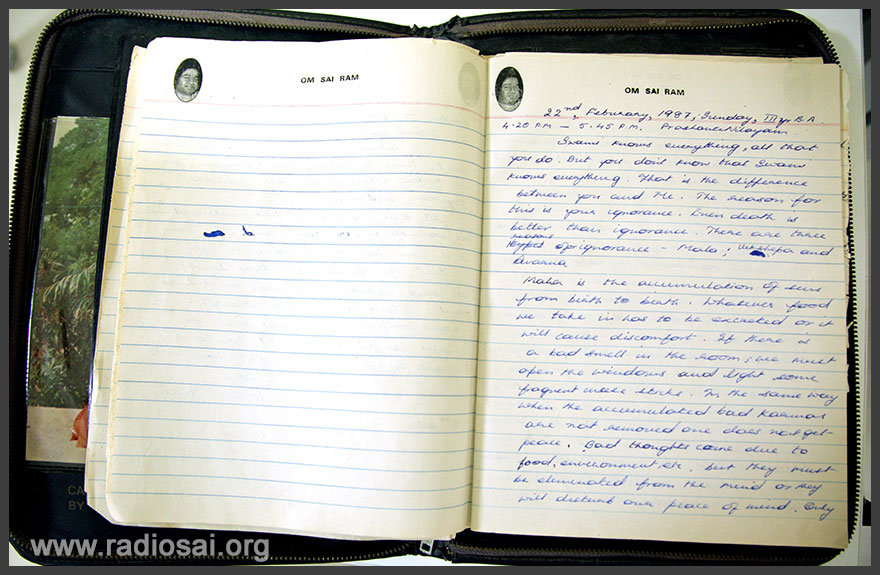 |
| Precious words of wisdom and divine moments saved diligently for the benefit of posterity - Ms. Sowmya Roopa's diary |
2. Take Strength from Spirituality
Knowledge and skill do not always come to a student’s rescue in difficult times - it is spirituality that helps them cope with problems and emerge successful. It is for this reason that every child above five years of age must attend Bal Vikas (Sathya Sai Education).
- Brindavan, 4 March 1988
3. Who Can Teach Bal Vikas and What to Teach in Bal Vikas?
You need not be a professional teacher to teach Bal Vikas. Start teaching Bal Vikas or Sai Spiritual Education at home. Teach at least 4 - 5 children. Teach the children moral values. Teach them how to ask permission. Tell them not to steal, fight or use foul language. Teach them to how and when to take permission. It is incorrect and incomplete just to tell children 'see no evil, do no evil, hear no evil'. You should say - 'see no evil, see what is good; hear no evil, hear what is good; speak no evil and speak what is good, think no evil and think what is good'. When you tell them not to do something, you must also tell them what you would like them to do instead.
Also remember, while spiritual teaching must be imparted, it is as important to touch upon practical issues - like how to cross the road. Teach them to look on either side of the road and cross when it is safe.
- Brindavan, 8 April 1989
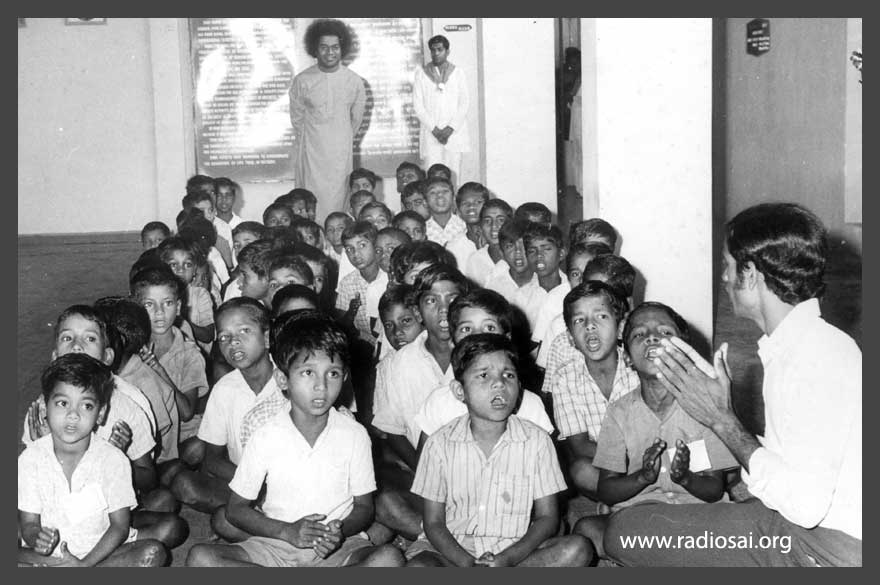 |
4. Character Building Starts from the Womb
When Mahatma Gandhi was a child, his mother Putlibai used to keep a special type of fast called Kokila Vrat. This fast was to welcome the spring. She would break her fast only after hearing the sound of the cuckoo bird. At one such time, Gandhiji was very sad that his mother had not eaten anything for a considerable stretch of time as she had not heard the sound of the cuckoo bird. So he went out of the house and from behind the window he made the sound of the cuckoo bird. Putlibai thought that it was a real cuckoo and broke her fast. Gandhiji then came and quietly confessed to her that it was he who had made the sound of the cuckoo bird. She slapped him and said, 'Being my son you have been dishonest. You are not fit to be called my son!’
This was the turning point in Gandhiji's life and from that day onwards he vowed to speak the truth. What do we learn from this story? As her child’s first teacher, a mother’s role is more about character building than imparting bookish knowledge. And, this role starts right from when the child is in the mother’s womb.
- 4 March 1989
5. Nurture the Unborn Child
Not every woman becomes a teacher, but most women will become mothers – so be a good mother. Father is the seed and mother is the earth. The seed should be good but the soil on which the seed grows should be good too. The soil offers lifelong nourishment to the plant. Even when the plant becomes a tree, its roots need the nourishment and support from the soil. So the mother's support to her child is life-long. And, as learning begins from the womb, expectant mothers must have good thoughts. I see many of them passing their time reading novels and watching films. This is not good.
There is a cord that connects the mother and the child. This is the umbilical cord, which not only provides food and blood sustenance to the child but also carries the mother’s thoughts to the foetus as was highlighted in the Mahabharatha through the example of Subhadra and Abhimanyu. So, the mother must speak, read and hear good things. A pregnant woman must read Bhagavatam, Prahlad Charitra and Dhruva Charitra.
- 8 April 1988
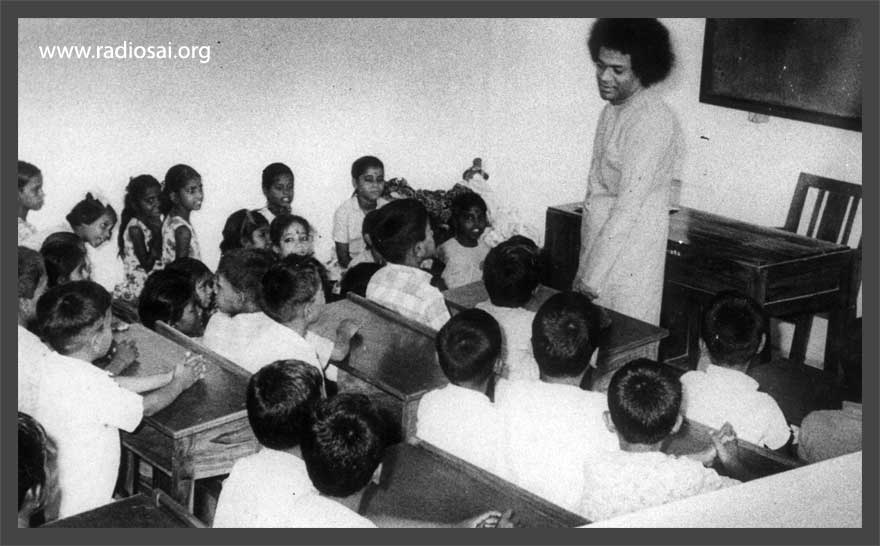 |
6. Conduct of an Ideal Teacher
A good teacher must be punctual. As teachers, you must also practice what you say. For example, if you ask the students not to talk too much, then it is important that you do not indulge in unnecessary chatter. Children these days are very smart. They observe the teacher and then say – ‘Dekho kaisa teacher hai (See what sort of Teacher he/she is)!’ The teacher is like the tank and the students are like the taps. If the water in the tank is pure then the water that flows out of the tap is also pure.
- Prasanthi Nilayam, Prize Distribution Day, 14 January, 1992
7. Correcting Students
How should you correct children? Tell them again and again until they grow aware of their mistake and adopt the right conduct as a daily practice.
- June 1989
Teach them about self-punishment too. Tell them that if they make a mistake, they need to choose their own method of self correction by imposing their own punishment. Such an approach will make sure children do not repeat the mistake.
- 4 March 1988
8. Corporal Punishment
Do not beat children at any cost or under any condition. Instead, give them good counsel. Keep a firm tone and offer a stern warning. Control and guide them with just a firm look in the eyes, as mothers do. Always practice non-violence and love in your interaction with children. Never violate the sanctity of this pure and unsullied relationship by hitting a child.
- 23 March 1995
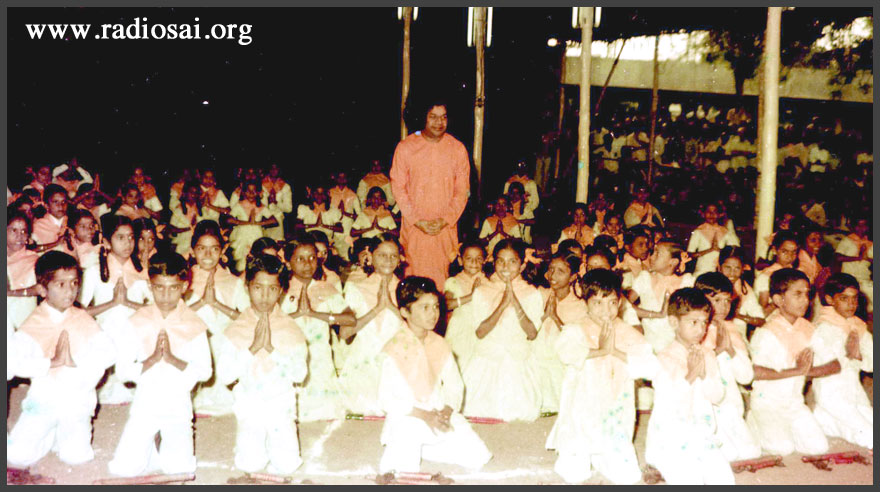 |
9. Power of Positive Motivation
Always use terms like ‘good boy’, ‘good girl’, etc. Encourage them. Non-verbal communication is also an effective tool for teachers. Teachers and parents should not be like Gandhari and Dhritarashtra - do not be blind to the faults of the children and just as you need to correct their mistakes immediately, it is as important to offer them instant appreciation.
- June 1989
10. Let Them Speak!
Until the third grade or until the children are ten years old, encourage them to talk. In many schools across India right from kindergarten, the teacher tells her students to put their finger on their lips and stay quiet. Only when children talk will they learn the art of conversation and effective speaking habits. If you must, slowly control the children from the fourth grade onwards. This is to teach them when to speak and when to remain silent.
- April 1989
11. Teaching Aids
While teaching children the harmful effects of something, tell them there is always some good in it too. If you are teaching a class about the dangers of tobacco on health, insert a little fact that the tobacco plant is not bad in itself as it gives oxygen and can be used as an insecticide. Remind them always to see no evil, see what is good. Also, use display charts to depict human values that will serve as reference points for the child. Use song, dance and stories, wherever you can to add meaning to your lessons.
- 4 March 1988
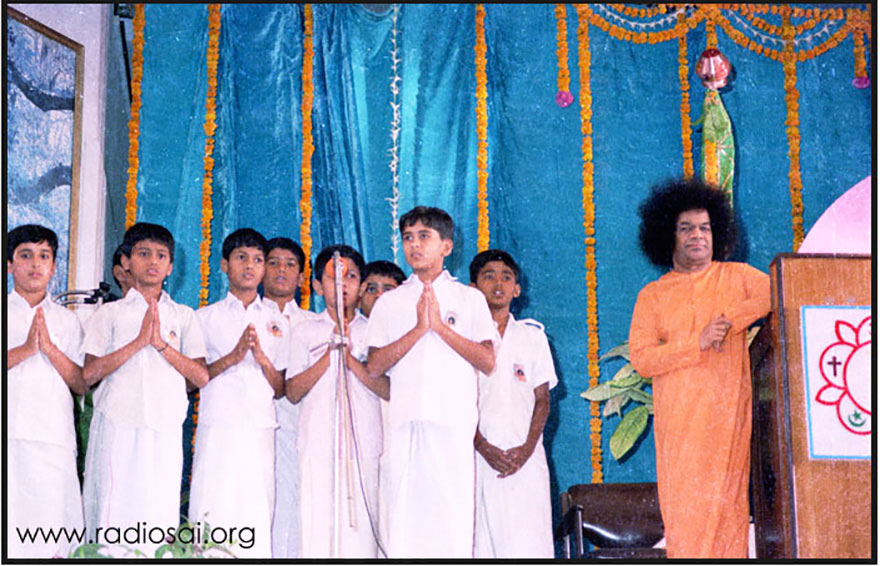 |
12. Managing Stress
Some problems don’t need managing. Leave them alone and they will soon sort themselves out. If children have the problem of bed-wetting, understand that they have left their parents back home. It’s natural for them to be a little tense or anxious. After some days they will get used to their school and their problems will automatically stop. There is no need for medicine or counselling. Do not make such children sleep on the upper cot or it will rain on the lower cots!
- Ooty, April 1989
13. Intervention
Once, Bhagavan saw a first standard boy standing in the front row. He had lost his milk tooth. Bhagavan asked him what had happened to his tooth. He replied that another boy had hit him. Bhagavan then looked at the other boy and asked him – ‘did you hit him?’ The other boy said he hit very lightly but the tooth fell as it was already shaking.Bhagavan pacified them that they were brothers and ought not to fight with each other. Swami reminded us that in case of a minor altercation between children, give both sides a fair chance to speak. Do not pass any harsh judgement on either of them. Listen to both, help them realise their mistake and advise them to live in love and unity.
- Ooty, 1991
14. Nutrition
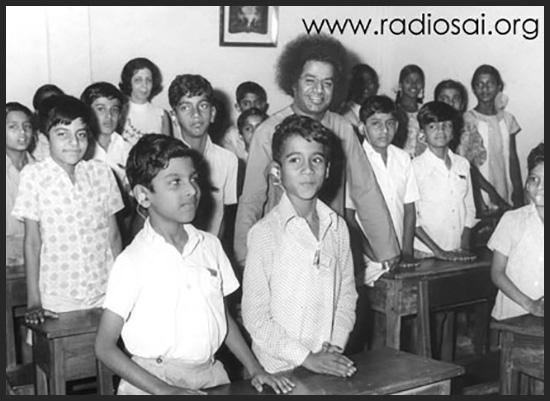 |
Children should be given freshly cooked food. Hot porridge for breakfast along with another cooked item like idli or dosa is good. Porridge could be made out of wheat, ragi, sevaian or with rice.
Soak groundnuts in water at night, drain the water the next morning and give these nuts to the children – one tablespoon per child - along with salt and pepper or jaggery according to taste. This is a source of protein, especially for growing boys, which aids their muscle development. You could also give green gram sprouts.
- Ooty, April 1989
Try and discourage children from eating cakes or pizza – these can be given occasionally. If the quantity of milk falls short in comparison to the number of children, do not add water to the milk. You can add beverages like Viva, Bournvita or Horlicks to the milk to make it more nourishing.
But the milk should not be watery. Children can be given fruits and salad. So remember children’s meals should comprise fruits, salads, freshly cooked food, sprouted moong, sprouted peanuts, and milk. When they fall sick, give them soft rice, non-spicy dal and boiled vegetables. The mess bill money must be spent completely on the child in the same academic year, and not be carried over to the next academic year. Spend it for the purpose meant for. Account for it. If teachers wish to have something spicy like pickles, you can have it in your room, not in front of the children.
- Puttaparthi, 23 March 1995
15. Festivals and Food
Use every festival as a teaching opportunity for highlighting the significance of healthy food. Explain how good the steamed food made during Ganesh Chathurthi is. Link it to a medical fact. Or, the value of bananas and their potassium content during the Onam festival. Create a seamless syllabus to weave one subject with another. And, if you have to use poetry and song to make your point, why not!
16. Balance
Develop a single-minded focus on God. Just as the garba dancers of Gujarat hold so many pots on their head and yet dance so skilfully without losing balance and without missing one step in their dance. Now, dear teachers, just as I illustrated my point using the analogy or word picture of the garba dancers, teachers must also explain their point using word pictures.
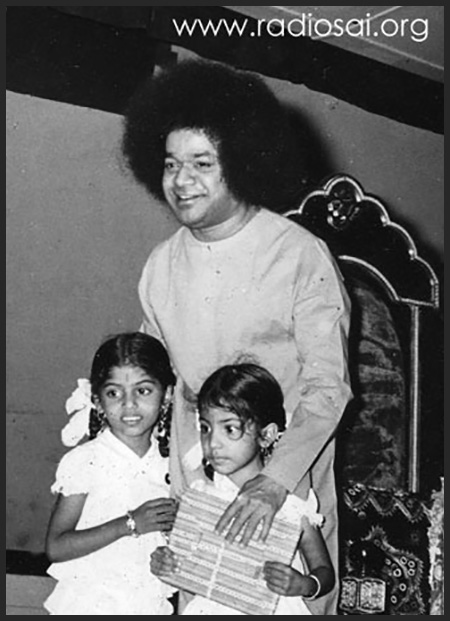 |
17. Terms of Endearment
No teacher should shout at a child in front of the others. The child always responds better when spoken to alone and in a calm manner. Use words of endearment to address all your students. Address them as ‘My dear boys and girls’ or ‘My dear students’ - 'Divyatmaswaroopulara' or 'Premswaroopulara'. Speak sweetly.
But also keep the balance between love and law. Give plenty of warnings before you correct a child. A good teacher can control her students with just one look – a firm look. When you see a change in a child, forgive the child. Never hold on to a wrong opinion of someone. See the new growth in the child and respond accordingly. Use a lot of jokes and humour in your teaching.
18. Meaning of Education
What is the meaning of education? It is to put into practice what one has learned, for practice makes perfect. It is more than a mere collection of facts. If a child does not know the answer to a question, do not ridicule or make the child feel small. Give the answer with love and kindness. Always remember 'Love All Serve All, Help Ever, Hurt Never'.
- 22 February 1987
19. Look After the Teacher
Take good care of the teachers. Pay them what is rightfully their due and provide them with comfort. This will encourage them to work better and stay motivated.
- February 2000 (As told to the Principal of the Sai School in Rishikesh)
20. Respect Teachers
Teachers should never ever be scolded in public or in front of the children. The Principal must take the teacher aside to the office and speak respectfully while addressing any concern. Respect must not be confined to the teacher alone. The same should be extended to the teacher’s family members, particularly parents. Welcome them warmly and give them special seating at the school's annual function or Teacher’s Day. This is important to make a teacher feel valued and cared for.
- 23 March, 1995
21. Sorting Out Discordant Perspectives - the MYOB way
Never sort out grievances between adults in front of children. Bhagavan can stop teachers from fighting in a trice but that is not the solution. ‘Purusha prayatna’ or human effort is essential for resolving differences. Each adult in the school must be mindful of one's own work, not interfere in the work of other teachers. Simply said, mind your own business. If you see that somebody needs your help, or they are not doing their work properly, then offer to help. Ask, nicely ‘may I help you’. If they take your offer, go ahead and help. If not, leave them alone so they learn how to solve their own problems. They may even come up with a better idea than yours!
- June 1990 in Prasanthi Nilayam during an interview to the Ooty school staff
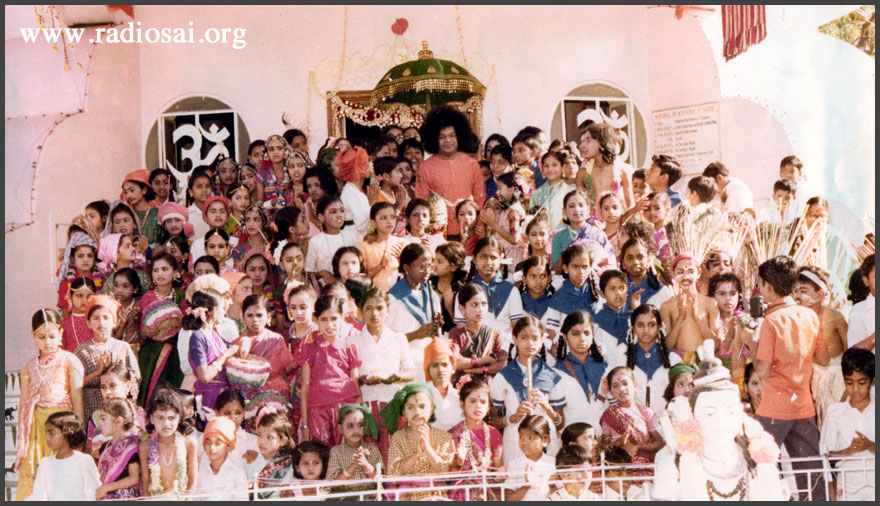 |
22. Stand By Truth
Why did Karna suffer so much? Because he kept quiet when something wrong was unfolding before his eyes. He did not protest against the wrong. So, he had to suffer the consequences. When you see something wrong happening around you, do not keep quiet. If a thief runs past you and the police arrive and enquire about him and you keep quiet, remember you earn 50% of the thief’s sin. So, speak up. But also remember that you should not go on and on about the mistake when speaking up. Make your case and step back.
- June 1991
23. Interaction Between the Principal and Teacher
A teacher is like the stomach and the Principal the head. Just as the food gets digested and the blood goes from the stomach through various organs to the brain, ideas and suggestions should go from the teachers to the head of the organisation. I say this because teachers are in direct contact with children, and therefore know best what ideas need to be implemented for the benefit of children. So a teacher must never hesitate to share her thoughts.
- 23 March 1995, Puttaparthi
24. Experience and Wisdom Must Be Respected
Staff senior in age should never hesitate to point out the flaws or correct the younger faculty members. Younger staff members must not only respect the older teachers but also take any correction in good spirit. Even if administratively a younger person is in a higher position in terms of hierarchy, and an elderly person is in a lower position, then the older person must be respected. Experience and wisdom must be given its due credit.
- 23 March 1995, Puttaparthi
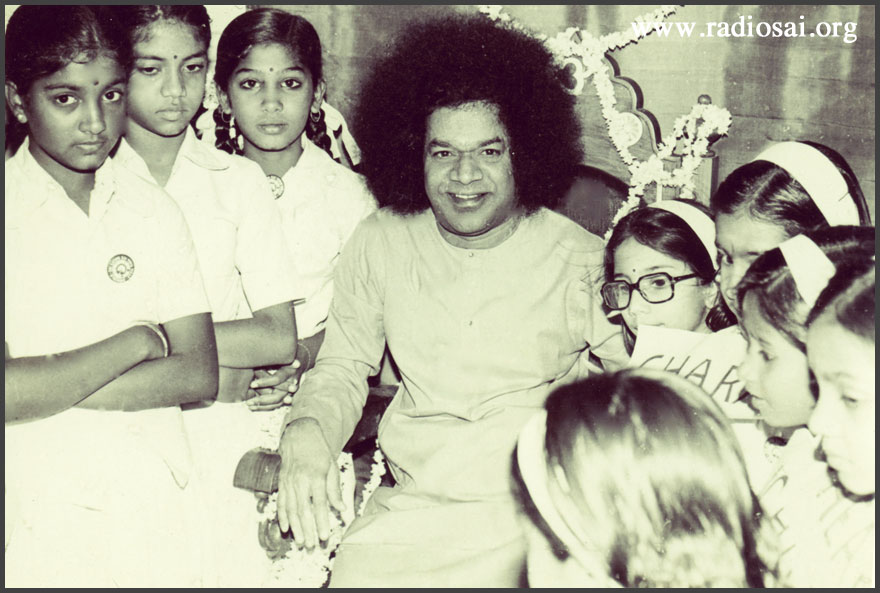 |
25. Appreciate and Encourage Team Effort
It takes a whole team to make a success of any task. Bhagavan demonstrated that teachers should be appreciated for their sincerity and hard work. He often praised them for their cooperative spirit and team work after such events as the Annual Sports Day.
- Radio Sai Team
| comments powered by Disqus |
What do you think about this article? Please let us know by writing in to h2h@radiosai.org. Do not forget to mention your name and country.







